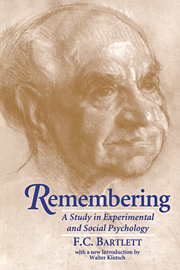Book contents
- Frontmatter
- Contents
- Biography of Sir Frederic C. Bartlett
- Introduction by Walter Kintsch
- Preface
- PART I EXPERIMENTAL STUDIES
- Chapter I Experiment in Psychology
- Chapter II Experiments on Perceiving
- Chapter III Experiments on Imaging
- Chapter IV Experiments on Remembering: (a) The Method of Description
- Chapter V Experiments on Remembering: (b) The Method of Repeated Reproduction
- Chapter VI Experiments on Remembering: (c) The Method of Picture Writing
- Chapter VII Experiments on Remembering: (d) The Method of Serial Reproduction; I
- Chapter VIII Experiments on Remembering: (e) The Method of Serial Reproduction; II. Picture Material
- Chapter IX Perceiving, Recognising, Remembering
- Chapter X A Theory of Remembering
- Chapter XI Images and their Functions
- Chapter XII Meaning
- PART II REMEMBERING AS A STUDY IN SOCIAL PSYCHOLOGY
- Index
- Plate section
Chapter I - Experiment in Psychology
Published online by Cambridge University Press: 04 August 2010
- Frontmatter
- Contents
- Biography of Sir Frederic C. Bartlett
- Introduction by Walter Kintsch
- Preface
- PART I EXPERIMENTAL STUDIES
- Chapter I Experiment in Psychology
- Chapter II Experiments on Perceiving
- Chapter III Experiments on Imaging
- Chapter IV Experiments on Remembering: (a) The Method of Description
- Chapter V Experiments on Remembering: (b) The Method of Repeated Reproduction
- Chapter VI Experiments on Remembering: (c) The Method of Picture Writing
- Chapter VII Experiments on Remembering: (d) The Method of Serial Reproduction; I
- Chapter VIII Experiments on Remembering: (e) The Method of Serial Reproduction; II. Picture Material
- Chapter IX Perceiving, Recognising, Remembering
- Chapter X A Theory of Remembering
- Chapter XI Images and their Functions
- Chapter XII Meaning
- PART II REMEMBERING AS A STUDY IN SOCIAL PSYCHOLOGY
- Index
- Plate section
Summary
ITS BEGINNINGS
No doubt there is a sense in which it is true to say that experiment in psychology is “at least as old as Aristotle”; but certainly it can claim no great age as a method of systematic exploration of human reactions. This is a matter of some significance; for it means that, before experiment was systematically applied in psychology, the experimental method had already a long history of development in other realms, upon which the early experimenters in psychology built both their aims and their methods. All the pioneers in experimental psychology were trained either in physics or in physiology. Their influence, both for good and for ill, still remains stamped upon the accepted methods of the psychological laboratory. Further, as was natural at the time, they were often men of a strong philosophic bent. Gustav Theodor Fechner, who is usually regarded as the founder of experimental psychology, was, in fact, concerned mainly to establish a panpsychic view of the Universe. The tendency to use psychological experiment chiefly as a buttress to some all-embracing philosophical theory is one that has clung to experimental psychology ever since its earliest days, and has provided the critics of this branch of science with many of their most potent modes of attack.
Fechner took his degree in medicine, but turned soon to physics and mathematics. In developing his methods he built upon the work of E. H. Weber, the physiologist, and had the close co-operation of A. W. Volkmann, who was Professor of Comparative Anatomy at Leipzig.
- Type
- Chapter
- Information
- RememberingA Study in Experimental and Social Psychology, pp. 1 - 13Publisher: Cambridge University PressPrint publication year: 1995



